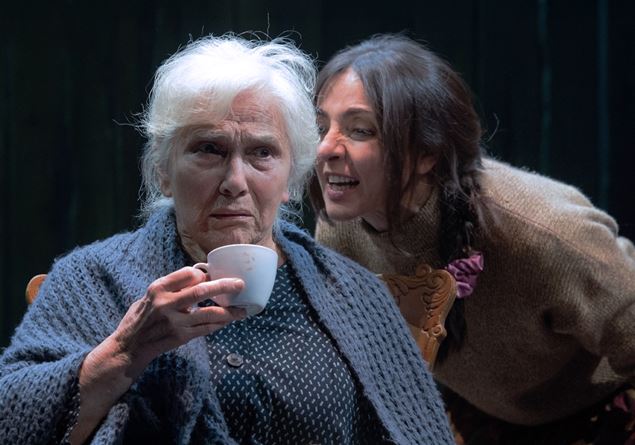That Ambra Angiolini is now a leading actress in the panorama of cinema and now also of Italian theater is beyond question. Her name reigns supreme on the billboard and also attracts newcomers to the national scene, curious to see her live and in roles different from those of the presenter and diva of Italian cinema. This time, the clothes are those of The Little Queen of Leenaneat the Franco Parenti Theater until 2 November, full-fledged overture of the new theatrical season of the theater directed by Andree Ruth Shammah.
The text by the award-winning playwright, screenwriter and theater and film director Martin McDonagh, directed by Raphael Tobia Vogeltells of a small and dysfunctional family unit: Maureen (Ambra Angiolini), a forty-year-old and disillusioned bachelor, and Mag (Ivana Monti), her elderly and despotic mother, confined to a rocking chair and with a bandaged hand. In modern terms, we would say the relationship between a caregiver and a familiar patient.
Context: Ireland in the late 1990sto be precise, the farmhouse on a remote hill in a small village in County Galway, overlooking the ocean. The atmosphere is dark and dense, faithfully supported by Angelo Linzalata’s imposing scenography: it is the interior of a humble house, few poor objects, a palisade that acts as a load-bearing wall on which a large cross and a window are carved, a rocking chair that constitutes the perspective pivot of the scene, a table and a sink.
Maureen and Mag live on the income of years of forced cohabitation, of a worn-out parental relationship bordering on the grotesque, where the dynamics of power and emotional dependence create a game of use and abuse on the part of both women. A situation which, if taken out of the context of reference, is hotly topical. So when Maureen, for the first time in years, receives an invitation to the farewell party of an old friend leaving for America, she is thwarted by Mag, who does her utmost to ensure that the message is not delivered to her daughter. Having met the boy spokesperson of the invitation (Edoardo Rivoira) on the way home, Maureen discovers her mother’s lie and, after taking verbal revenge, goes to the party and returns home with a man, Patrick known as Pato (Stefano Annoni).
An unfortunate outrage for the mother, who the next morning tries to warn the man of the fact that her daughter has been admitted to a psychiatric hospital in the past. Despite the premise, Pato will continue to write to Maureen, also trying to convince her to move with him to Boston to permanently change her life. Another attempt sabotaged by Mag, who once again destroys the letter addressed to her daughter.
Beyond the plot, of great emotional and psychological value, which uses the comic to delve into the tragic in the sharpest and most alienating way possible, the modulation of the voice, the gestures, the unsaid and the violence of the language of both Angiolini and Ivana Monti are of extraordinary support to the dramaturgy. Even the support of Stefano Annoni and Edoardo Rivoira, respectively Patrick and his brother Ray, are preparatory to a tight, magnetic and at times grotesque narration, deliberately underlining the caricatural emphasis of the original text.
An hour and forty-five minutes of show marked by the closing of a black veil on the change of scene and which, every time, garners scattered applause from the audience in the stalls. From this setting, Vogel directs the cruel game between mother and daughter well: through Ambra Angiolini and Ivana Monti, it tells the darkest side of love, the one that turns into control, dependence, the need to be seen.
A ferocious and current show, which behind the bitter comedy forces the spectator to look at himself in the mirror. Because, after all, each of us has known a “Mag” or a “Maureen” in our own home.


